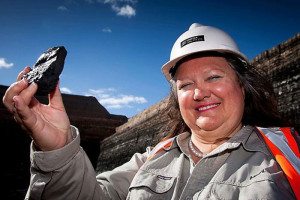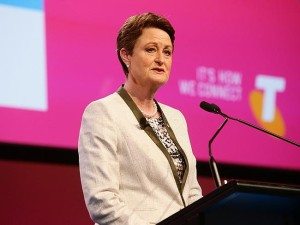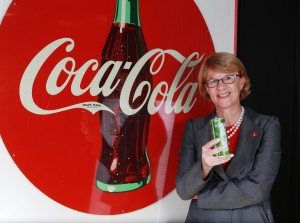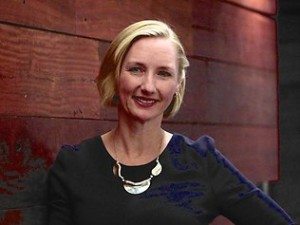Startups
Top 5 Australian Corporate Business Women To Follow

Despite the various steps taken by the Australian government and organisations to ensure greater equality in the workplace for women, it’s yet to become a reality.
ABS figures show that men are earning, on average, more than women in the workplace – $298.20 more, to be exact. Statistics from the WGEA (Workplace Gender Equality Agency) further reiterates this gap, revealing that only 12 percent of chair and 17.3 percent of CEO positions are held by women.
Considering that the sex discrimination act came into effect in 1984, these are very poor statistics – as is the fact that the amount of senior business roles occupied by women ten years ago was the same as it is today at 22 percent.
The glass ceiling, which author Ann Morrison describes as something ‘…so subtle that it is transparent, yet so strong that it prevents women from moving up the corporate hierarchy,’ (Breaking the Glass Ceiling) is still very much there.
Yet there are women who have transcended the patriarchal system and have become some of the most powerful business people in Australia.
Here’s a look at the top five business women in Australia:
1. Gina Rinehart
 Topping the list is Gina Rinehart. Mining heiress and Chairman of Hancock Prospecting Group and with an estimated net worth of $16bn, she is the richest person in Australia.
Topping the list is Gina Rinehart. Mining heiress and Chairman of Hancock Prospecting Group and with an estimated net worth of $16bn, she is the richest person in Australia.
Her wealth was initially accumulated through her father, Lang Hancock, who discovered the world’s largest iron ore deposit and subsequently became one of the richest men in Australia.
However, she has proven to be far more than a passive heiress, learning the mining business from the ground up. Over 20 years she transformed the firm into ‘Australia’s largest and most successful private company group through hard work, great effort, long hours and dedication, with the assistance of only a very small executive team,’ according to Rinehart’s spokesperson Jay Newby.
She took the reins of the Roy Hill iron ore tenements in Western Australia’s Pilbara region 22 years ago, and will begin a $10bn iron operation to export to Asia by the end of the year.
Rinehart has previously commented on her dislike of being called an ‘heiress,’ due to her many accomplishments within the company. Alecia Simmonds of theage.com.au says that she can’t help ‘furrow [her] feminist brows when Rinehart is called an heiress while James Packer is called a billionaire.’
“I’m not ashamed of being a girl, and since I’m a girl I will do what a boy would have done had I been a boy”. – Gina Rinehart
2. Catherine Livingstone
 The Business Council found its first female president in the form of Catherine Livingstone last year.
The Business Council found its first female president in the form of Catherine Livingstone last year.
She is a strong advocate for research and innovation, claiming that that the world is looking for solutions and technologies: ‘It is an area in which Australia could take a lead with enormous economic rewards, if we are able to make it our knowledge and technologies that are sought out.’ She claims in an interview for CSIRO.
Since 2009 she has been the chair of Telstra, turning the company around with CEO David Thodey, contributing to the share price of the company more than doubling during the last few years.
Livingstone is highly respected in the sector, described by Macquarie Group chairman David Clarke in The Weekend Australian as ‘a very good contributor, absolutely diligent in doing her work’ and ‘..when she’s got something to say, she says it. She doesn’t talk for the sake of it. So people really listen to what she’s saying.’
Prior to Telstra she gained her impressive reputation as Chief Executive of bionic ear icon Cochlear, and was instrumental in getting the company onto the ASX 19 years ago. In 2012 she was also deemed as the second most powerful director in Australia by site Crikey.
3. Alison Watkins
 Since becoming chief executive of Coca-Cola Amatil, Alison Watkins has made many changes which have led to an improvement in the company’s declining profits. In particular she has haggled with US Coca-Cola to procure a $600m funding deal and has reshuffled senior management.
Since becoming chief executive of Coca-Cola Amatil, Alison Watkins has made many changes which have led to an improvement in the company’s declining profits. In particular she has haggled with US Coca-Cola to procure a $600m funding deal and has reshuffled senior management.
She was previously the CEO and Managing Director of GrainCorp Ltd, Australia’s largest agribusiness and a top ASX 100 company.
Speaking of her issues with self-confidence in the Financial Review, she describes how she came to land the GrainCorp job:
“I got some feedback..that showed my peers thought I had strong leadership attributes…but I rated myself much less favourably, which I took as a good thing until the excellent coach I had pointed out that it meant I was underestimating my ability to make a difference. I realised I was being undemanding in a way that meant I was not setting myself and my teams up for success, and that wasn’t good for anyone“.
Watkins took her new outlook into the interview to become CEO of GrainCorp and followed up with a letter to the Chairman outlining her key skills and credentials. Her forthrightness won her the job.
She is now a champion of women who are trying to work their way up the line in their business and feels that all women, who are in a position to do so, should enable their female co-workers.
“It’s the way you make a difference to women in your workplace; the risks you take to create opportunities for them and help them succeed, including in line roles…I will contribute to changing the perceptions of what a female leader is and to accelerating the day that will come when the term ‘female CEO’ doesn’t evoke any particular perceptions at all“.

4. Katie Page
 Page joined Harvey Norman in 1983 as a young assistant to the boss. She slowly worked her way up the ranks until she was made CEO in 1999, making her one of the longest serving chief executives of an Australian-listed company.
Page joined Harvey Norman in 1983 as a young assistant to the boss. She slowly worked her way up the ranks until she was made CEO in 1999, making her one of the longest serving chief executives of an Australian-listed company.
She runs the 200+ store retail business with a turnover of more than $2.6bn a year (& franchise operations of $4.6bn) alongside her husband Gerry Harvey, who co-founded the company in 1982 with Ian Norman.
“There is no other consistent female [chief executive] out there and it just happens to be we are a husband and wife team“, she told The Australian. “Gerry is the executive chairman. The chairman is there to make sure that the big picture is right. They are there for the big decisions. As chief executive, I am running the business“.
Page is unsentimental about her husband’s higher profile – she knows the company works because they are a team, “The board sets the strategy and I deliver it as chief executive. We have skill sets as a couple that probably make us stronger as a company compared with others“.
Page has also dedicated herself to championing women in horse racing through Magic Millions, and providing a $500,000 incentive for women thoroughbred owners.
5. Susan Lloyd-Hurwitz
 Two and a half years ago Lloyd-Hurwitz’s appointment of chief executive of Mirvac was a shock for the male-dominated Australian property industry.
Two and a half years ago Lloyd-Hurwitz’s appointment of chief executive of Mirvac was a shock for the male-dominated Australian property industry.
Since arriving at the business, with a market cap of $7bn and a top 50 ranking of ASX-listed companies, she has focused on investment. She spent $1bn buying new assets in order to restore the group’s property portfolio, but also sold off property worth $1bn.
The strategy Lloyd-Hurwitz adopted has made the most of the changing property market since the financial crash.
In 2014 she was crowned Telstra NSW Business Woman of the Year. She told The Saturday Telegraph: “Along the way, I’ve had some important mentors who have invested in me, taken a risk, held up the mirror for me and guided me. In all business relationships, I strive to listen, to create mutually beneficial outcomes and to communicate often and with clarity“.
“A man’s got to do what a man’s got to do. A woman must do what he can’t”. – Rhonda Hansome
There is still a long way to go for Australian businesswomen, but these five female trailblazers show that it is possible to not only succeed, but triumph, in business and make more important fractures in that tough glass ceiling.
Shift Your Mindset
10 Powerful Traits Every True Thought Leader Possesses
In a world saturated with noise, thought leadership is the quiet power that shifts paradigms.

Thought leadership is more than just having strong opinions. It’s the ability to influence, inspire, and guide others by sharing original insights, innovative ideas, and deep domain expertise. It’s about sparking change, not just talking about it. (more…)
Startups
The Young Man’s Guide to Creativity: 10 Daily Habits to Improve Your Creative Mind
10 daily habits you can put into practice right now to improve your creativity

When I was 22 years old, I became a Top Writer on Medium.
It’s not an easy path. I lived in the Philippines and had never received a penny after writing over 100 digital articles. But I treated it like practice. If I couldn’t get other people to read my work for free, why would they trust me? (more…)
Startups
If You’re Not Reinventing Yourself, You’re Falling Behind! Here’s What To Do
Reinvention is the secret weapon of high performers.

Reinvention is the secret weapon of high performers.
Most careers follow a predictable script. You start at the bottom, climb the ranks, and eventually settle into something resembling stability. But the people who make the biggest impact, the ones who don’t just play the game but change it, break that script. They evolve. They shift. They reinvent. (more…)
Startups
The Silent Killer of Startups: This Might Be Draining Your Profits
If you are careless in managing your inventory, it can lead to a sudden depletion in cash flow

There are several issues in a startup, but if you are really careless in managing your inventory, it can lead to a sudden depletion in cash flow. Old, broken, and misplaced stock wastes space and profits. If inventories and storage aren’t managed properly, it hardly ever works.
-

 Health & Fitness2 weeks ago
Health & Fitness2 weeks agoWhat Minimalism Actually Means for Your Wellness Choices
-

 News1 week ago
News1 week agoBrandon Willington Builds 7-Figure Business by Ignoring Almost Everything
-

 Did You Know2 weeks ago
Did You Know2 weeks agoWhy Most Online Courses Fail and How to Fix Them
-

 Business2 weeks ago
Business2 weeks agoIf Your Business Internet Keeps Letting You Down, Read This
-

 Business2 days ago
Business2 days agoEntrepreneur’s Guide to Pay Stubs: Why Freelancers and Small Business Owners Need a Smart Generator
-

 Finances9 hours ago
Finances9 hours agoWhy Financial Stress Is One of the Biggest Barriers to Personal Growth
-

 Business7 hours ago
Business7 hours agoThe Simple Security Stack Every Online Business Needs















1 Comment